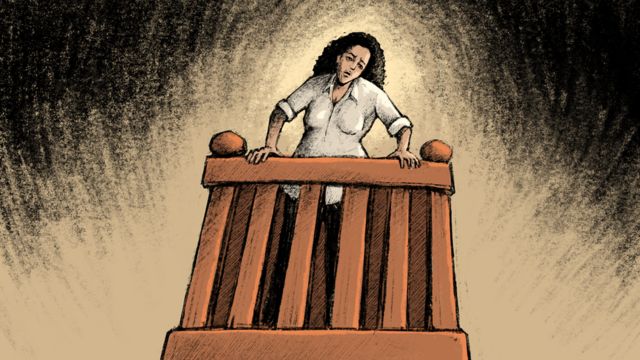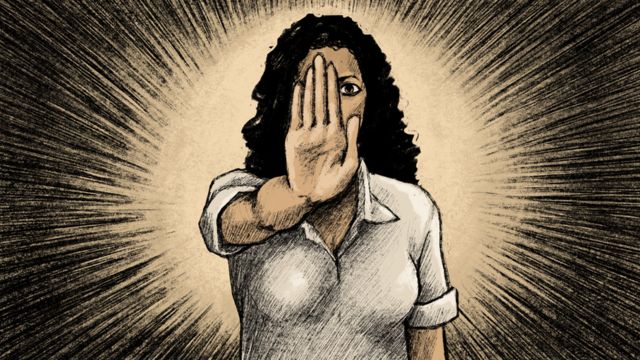When the question was raised on the woman in rape

KATHMANDU: AUGUST 12 – When your pocket has been cut, no one turns back and asks, “You must have done something?” But when the matter is of rape, then this question has been arising. This question is being asked even after it has been declared illegal to ask such a question in the law.
When we read the verdict acquitting former Tehelka magazine editor Tarun Tejpal of rape charges, the echo of this question was clearly heard.
The question was whether Tarun Tejpal raped his junior colleague in the lift on two nights of November 2013 or not?
The victim was asked to reach the answer.
The question is, when did he have sex with whom before, whom did he write by email, with whom did he flirt by sending messages – if he was so used to sex then he must have consented even in those two nights?
She was smiling, looking in a good mood, being a part of office events even after the alleged rape – could she really be a rape victim if she was so happy?
At what angle were Tarun Tejpal’s thighs from the ground, the chiffon lining in the victim’s dress was above the knees or even below, Tejpal touched her fingers or inserted them into the victim’s body – if the victim remembered all these things correctly Otherwise, is she telling the truth?
In that 527-page judgment, the allegation of rape was held to be false and the accused was acquitted.
This is not just a coincidence. Different research in India over the past 35 years suggests that when rape victims behave differently from what is considered ‘right’ by society, their accused are punished less or acquitted. Is.
The law declares it wrong to give importance to the behavior of the victim in the trial of rape charges. Despite this, many judges reach decisions on the basis of such thinking. Let’s look at some examples.
A woman who had sex several times before being raped

Mrinal Satish, a professor of law at the National Law School of India University, has studied rape judgments in the Supreme Court and all the High Courts of the country from 1984 to 2009.
They found that in these 25 years, when rape occurred on a woman who had never had sex, the sentence was longer.
In cases where the woman accused of rape was found to be accustomed to having sex before or outside the marriage, the sentence was reduced.
The harsh attitude towards such women grows out of the same thinking of the society which looks down on the woman having sex before marriage.
The importance given to ‘virginity’ also implies that if the woman having sex was not so respected, then there would be no fear of losing her respect.
He would not have suffered much during the violence.
The basic conclusion of all these assumptions is that a woman who has had sex without marriage can make a false allegation of rape and it is possible that this case is only about consensual sex.
For example, the 1984 case of Prem Chand and others vs State of Haryana, in which a man, Ravi Shankar, was accused of raping and kidnapping a woman. According to the woman, when she went to complain to the police, two policemen also raped her.
The trial court found the three accused guilty. But when Ravi Shankar appealed in the Punjab and Haryana High Court, he was acquitted. The judgment said –
The prosecution has not been able to prove that the victim was less than 18 years of age. Then she used to roam around with Ravi Shankar, and there were sexual relations between them several times with consent.
When both the policemen did not get relief from the High Court, they went to the Supreme Court in 1989 where they were not acquitted but the sentence was reduced from ten years to five years. The judgment said –
The character of this woman is not good, she is easy to have sex, sensual behavior. Before giving statement, he discussed the incident in the police station with other people, it shows that his statement is not to be believed.

Over time, this method of investigating the sexual character of the victim has been upheld in the trial of rape cases in the eyes of the law.
In 2003, the Law Commission of India and the National Commission for Women reviewed it and said, “It has been observed that information on past sexual relations of women has been used to prove her consent to rape, thereby affecting her dignity and reputation.” gets hurt.”
On their recommendation, the Indian Evidence Act 1872 was amended in the same year and prohibited the questioning of the sexual conduct of the victim woman during the trial or the use of that information to prove her consent to rape.
But despite this it continued. For example, in the case of ‘State Vs Havildar’ filed in the year 2014, when the judgment came in the year 2015, it said –
The victim said that she had to wash her genitals after the rape as she started itching. This woman was married and had three children, so she was used to having sex. It is not that she was having sex for the first time in her life. In such a situation, the matter of itching in his private parts after the alleged violence is not understood. It is obvious that she washed her private parts so that the evidence of having sex with the accused was erased because these relations were consensual and she did not want her brother to know about it.
Delhi’s Dwarka fast track court acquitted the accused in this case.
A woman
Apart from question-and-answer test to prove sexual conduct of a woman in rape cases, the method of two-finger test has also been adopted in medical examination.
In this test, the doctor inserts one or two fingers into the vagina of the victim to check how ‘elastic’ she is.
Its official purpose is only to prove whether there was ‘penetration’ in the alleged incident of rape.
But the easy movement of two fingers is considered an indicator that the woman is accustomed to having sex.

In 2013, when the two-finger test was banned after the rape of Nirbhaya (Jyoti Pandey), there was a debate on the laws for such violence.
The Department of Health Research of the Ministry of Health issued guidelines for forensic examination of victims of sexual violence.
They said, “The two-finger test will henceforth be illegal because it is not a scientific method and will not be used. This method is medically useless and degrading to women.”
The Verma Committee, set up to review sexual violence laws, also clarified that “whether or not rape has taken place is a legal investigation, not a medical assessment”.
In the same year 2013, the ‘Center for Law and Policy Research’ studied the decisions of fast track courts set up to hear cases of sexual violence in Karnataka.
In more than 20 percent of the judgments, they found explicit mention of the two-finger test and comments on the victim’s past sexual conduct.
In the same year, the Gujarat High Court acquitted an accused of raping a minor in the case ‘Rameshbhai Chhannabhai Solanki v State of Gujarat’.
The trial court had found him guilty for this incident in 2005. But after the appeal, the High Court said –
The statements of both the doctors, one of whom is a gynecologist, clearly state that there was no injury on the genitals of the victim and it is clear from the medical certificate that she was in the habit of having sex.
The woman who was not hurt in the rape
One of the most important things to prove rape is the lack of consent of the woman. Consent is the difference between sex and rape.
Injuries on the private parts of the woman, marks of injury or scratches on her body in an attempt to stop the accused, tearing of clothes etc. have been considered as an indicator of non-consent.
But the opposite was also considered correct. When the woman did not have any signs of struggle, she was told as the proof of her consent.
In Mrinal Satish’s study, he found that even if courts did not say in writing that the absence of injuries meant consent, the sentence was shorter in cases where there was no evidence of injuries on the woman’s body.
Many courts have not even hesitated to say so, and have described the absence of injury marks as proof of consent.

For example, in the case of ‘State of Karnataka Vs. Shivananda Mahadevappa Murgi’ in the Belagavi Fast Track Court in Karnataka in the year 2014, the accused was acquitted because –
If this incident happened then it must have happened with the consent of the victim as there is no such evidence in the case like torn clothes, injury on the victim’s body etc. Medical and forensic evidence also do not substantiate the allegation of the victim.
In the same year 2014, the Supreme Court, in the case ‘Krishna v State of Haryana’, had clearly stated that the victim’s body was not required to have injuries to prove rape.
Rather, 30 years before this, in the year 1984, an amendment was made to the ‘Indian Evidence Act 1872’, according to which, if in any case of sexual violence it is proved that there was a sexual relationship, then the consent of the woman is determined by her statement. Will go
That is, if the woman says in the court that she did not consent and that statement is believed to be believed, then it will be considered true.
This change was made after the case of ‘Tukaram v State of Maharashtra’, also known as Mathura rape case.
In this case of 1972, two policemen were accused of raping a minor tribal girl in a police station. The lower court found him guilty, but after appeal, the Nagpur Bench of the Bombay High Court and then the Supreme Court acquitted him in 1978, saying –
The absence of any injury marks on the girl after that incident suggests that it was a peaceful incident and the claim of opposing the girl is fabricated… to say something to her brother, aunt and lover who came with her to the police station. Instead of going quietly with the accused and allowing him to satisfy his lust in every way, we feel that ‘consent’ cannot be brushed aside as ‘passive submission’.
There was a lot of condemnation of the decision of the Supreme Court and four professors together wrote an open letter to the Supreme Court. After which, as a result of the debate, changes were brought in the laws against sexual violence in 1983-84.
The woman who did not behave like a victim after rape
It is clear from this whole discussion that the laws against sexual violence in India are progressive and in the last decades many changes have been made in them keeping the interest of the victim paramount on the demand of the women’s movement and public.
Despite this, if we look at the National Crime Statistics Bureau data for 2019, this rate is only 27.8 percent in rape cases compared to the national average ‘conviction rate’ – 50.4 – for all crimes registered under IPC.
There are many reasons for this, but one important reason stems from a common social thought.

Researcher Preeti Pratishruti Dash studied 1635 rape judgments from 2013 to 2018 in lower courts in Delhi for the ‘Indian Law Review’.
They found that in about 25 per cent of the cases where the accused were found innocent, the victim’s statement was found to be unbelievable. And the main reason for this was their conduct before and after the rape.
For example, in the case of ‘State Vs. Naresh Dahiya and others’ filed in the year 2009, the Tis Hazari Court of Delhi acquitted the accused and said –
Even after the alleged rape took place, the victim instead of making noise, accompanied the accused from the hotel to the kiosk near Sablok Clinic and had gol gappas. Such behavior of a rape victim casts doubt on the veracity of her statement.
According to the study, other reasons for not believing the statement of the victim include not telling family and friends about the rape immediately and late filing of complaint with the police.
According to Indian law, a woman who has been raped can file a complaint at any time after the crime.
A late complaint certainly leads to problems such as gathering medical and forensic evidence and bringing witnesses, but this in itself cannot be a reason to treat the victim’s statement as false.
But this happened in the case of ‘State Vs Radhe Shyam Mishra’ of 2017. Delhi’s Tis Hazari Court acquitted the accused and when an appeal was filed in the Delhi High Court in 2019, the decision was upheld.
On filing of rape complaint with police one day late, the court said –
Even when the husband came to know about the rape of his wife late in the day, neither of them went to the police station, called 100 or told the neighbours. No explanation has been given for the reason for the delay in approaching the police.
There is hardly any other crime other than sexual violence, in which so many questions are asked to the victim. The finger pointed at his conduct. It’s so hard to believe him.
There is a struggle to change the law, which has been successful, but the bigger challenge is to fight and change the societal mindset which clearly stands in the way of decision.
The unequal relationship between men and women, high and low positions in society and the additional burden of prestige on women’s shoulders – unless these changes and equalization efforts are swift and widespread, the fight for justice will remain difficult.
-From BBC Hindi










